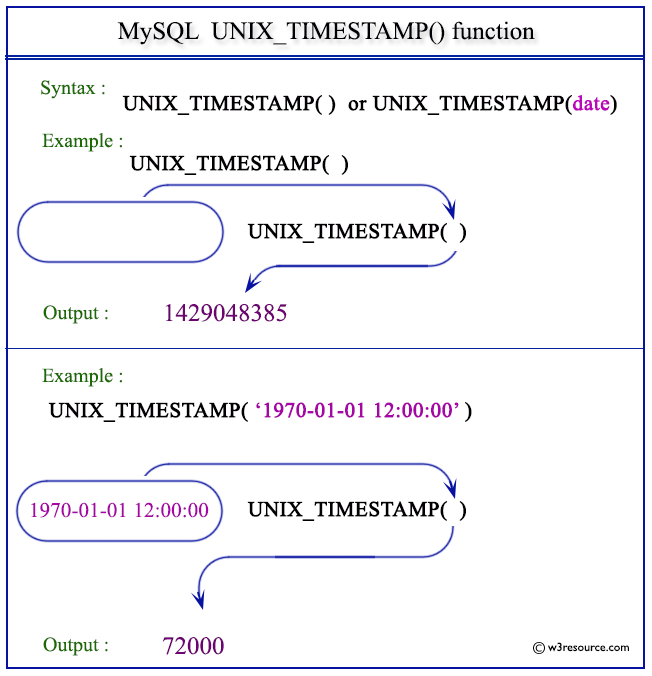MySQL UNIX_TIMESTAMP() function
UNIX_TIMESTAMP() function
MySQL UNIX_TIMESTAMP() returns a Unix timestamp in seconds since '1970-01-01 00:00:00' UTC as an unsigned integer if no arguments are passed with UNIX_TIMESTAMP().
When this function used with a date argument, it returns the value of the argument as an unsigned integer in seconds since '1970-01-01 00:00:00' UTC.
The argument may be a DATE, DATETIME,TIMESTAMP or a number in YYYYMMDD or YYMMDD.
Note: Since UNIX_TIMESTAMP() works on current datetime, your output may vary from the output shown.
This function is useful in -
- The Unix timestamp is a standardized way to represent time across different systems and platforms.
- The Unix timestamp is an absolute measure of time, which allows for precise date and time comparisons.
- UNIX_TIMESTAMP() is valuable for filtering records or data based on time criteria, such as selecting records within a specific time range.
- The Unix timestamp is commonly used in time series analysis to represent and analyze data over time.
- It's crucial in real-time applications where precise time measurements are required, such as in financial trading platforms.
- UNIX_TIMESTAMP() is used in log tables to record when events or actions occurred, providing an audit trail for system activity.
- The Unix timestamp is a standard format for exchanging time-related data between different systems or applications.
Syntax:
UNIX_TIMESTAMP(); UNIX_TIMESTAMP(date);
Arguments:
| Name | Description |
|---|---|
| date | A date value. |
Syntax Diagram: 1

Syntax Diagram: 2

MySQL Version: 8.0
Pictorial Presentation:

Example:
The following statement will return the unix timestamp in seconds as an unsigned integer since '1970-01-01 00:00:00' UTC.
Code:
SELECT UNIX_TIMESTAMP();
Output:
mysql> SELECT UNIX_TIMESTAMP(); +------------------+ | UNIX_TIMESTAMP() | +------------------+ | 1429048385 | +------------------+ 1 row in set (0.01 sec)
Example : UNIX_TIMESTAMP() on a specified date
The following statement will return the unix timestamp in seconds as an unsigned integer since '1970-01-01 00:00:00' UTC for the specified datetime 1970-01-01 12:00:00.
Code:
SELECT UNIX_TIMESTAMP('1970-01-01 12:00:00');
Output:
mysql> SELECT UNIX_TIMESTAMP('1970-01-01 12:00:00');
+---------------------------------------+
| UNIX_TIMESTAMP('1970-01-01 12:00:00') |
+---------------------------------------+
| 72000 |
+---------------------------------------+
1 row in set (0.00 sec)
Video Presentation:
All Date and Time Functions:
Click here to see the MySQL Date and time functions.
Previous: TO_DAYS()
Next: UTC_DATE()
